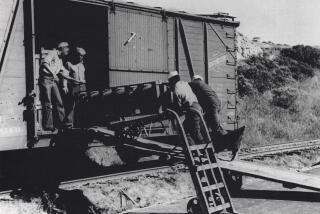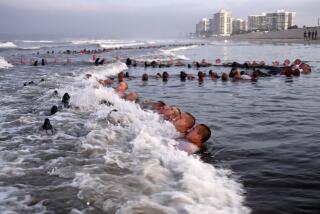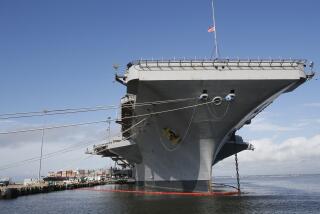Brindel Quoted: Probe Didn’t Go ‘High Enough’ : Stark Inquiry Disappoints Skipper
- Share via
WASHINGTON — The captain of the guided missile frigate Stark, forced to retire at a lower rank because of the attack that killed 37 sailors on his ship, said in an interview published Tuesday that the investigation didn’t go “high enough.”
Capt. Glenn R. Brindel said he is disappointed in the military for blaming him without scrutinizing the actions of his superiors.
“The investigation didn’t go high enough, but that’s all I’ll say about it,” Brindel told the San Diego Union. “I’m very disappointed, but I will tell you that (the decision) is only a piece of the puzzle.”
The interview was conducted Monday, after the Navy said Brindel, 43, and the Stark’s tactical weapons officer, Lt. Basil Moncrief Jr., 32, will not be court-martialed because they have accepted responsibility for the ship’s failure to defend itself against an Iraqi warplane. It said they agreed to end their naval careers.
The San Diego newspaper, quoting unidentified Navy sources, said earlier this month that the Stark had been conducting a “full-power run” of the ship’s engine the night of the attack. Such tests should not be conducted in potential war zones such as the Persian Gulf because the crew could be distracted, the sources told the newspaper.
“Pacific Fleet ships are not allowed to perform this kind of training in the Persian Gulf, but the Atlantic Fleet is,” Brindel said in the interview. “It would please me if the Atlantic Fleet ended the practice of performing engineering (training) while a ship is operationally deployed in the Persian Gulf.
“The crew’s attention had been less than what you would want in this area of operations,” Brindel said. “The executive officer and myself, we weren’t totally immersed in the training at all. I don’t want to give that impression.”
Adm. Frank B. Kelso II, the commander of the Atlantic Fleet, decided to issue letters of reprimand to Brindel and Moncrief and forgo courts-martial because nothing further would be gained through legal action, the Navy said.
Thirty-seven sailors died and 21 were injured when the Stark was struck by two Exocet missiles fired by an Iraqi plane on the night of May 17 while on routine patrol in the Persian Gulf. Iraq called the attack a mistake, an explanation the United States accepted.
The Pentagon has said the attack occurred without the Stark taking any defensive action, in part because the Iraqi warplane was “presumed friendly.” Nonetheless, the ship’s failure to take standard defensive precautions became the central focus of the military inquiry.
The letters of reprimand were issued by Kelso after an “admiral’s mast” on Monday during which he reviewed the circumstances of the attack.
Third Officer Reprimanded
Meanwhile, the Navy announced Tuesday that a third top officer of the Stark has been reprimanded for dereliction of duty in connection with the attack.
But Lt. Cmdr. Raymond Gajan Jr., 32, of Corpus Christi, Tex., the frigate’s second in command as its executive officer, received a lesser degree of punishment than the Stark’s captain and the weapons officer. Unlike the others, he has not asked to leave the Navy.
“He has the option to continue active naval service,” the Navy said.
Gajan was given a letter of admonition at an “admiral’s mast” Monday by Rear Adm. David Bennett, the deputy commander, Naval Surface Force, Atlantic Fleet, and was “detached for cause” from his position on the Stark. Gajan is assigned to Destroyer Squadron 8 in Mayport, Fla.
More to Read
Sign up for Essential California
The most important California stories and recommendations in your inbox every morning.
You may occasionally receive promotional content from the Los Angeles Times.









